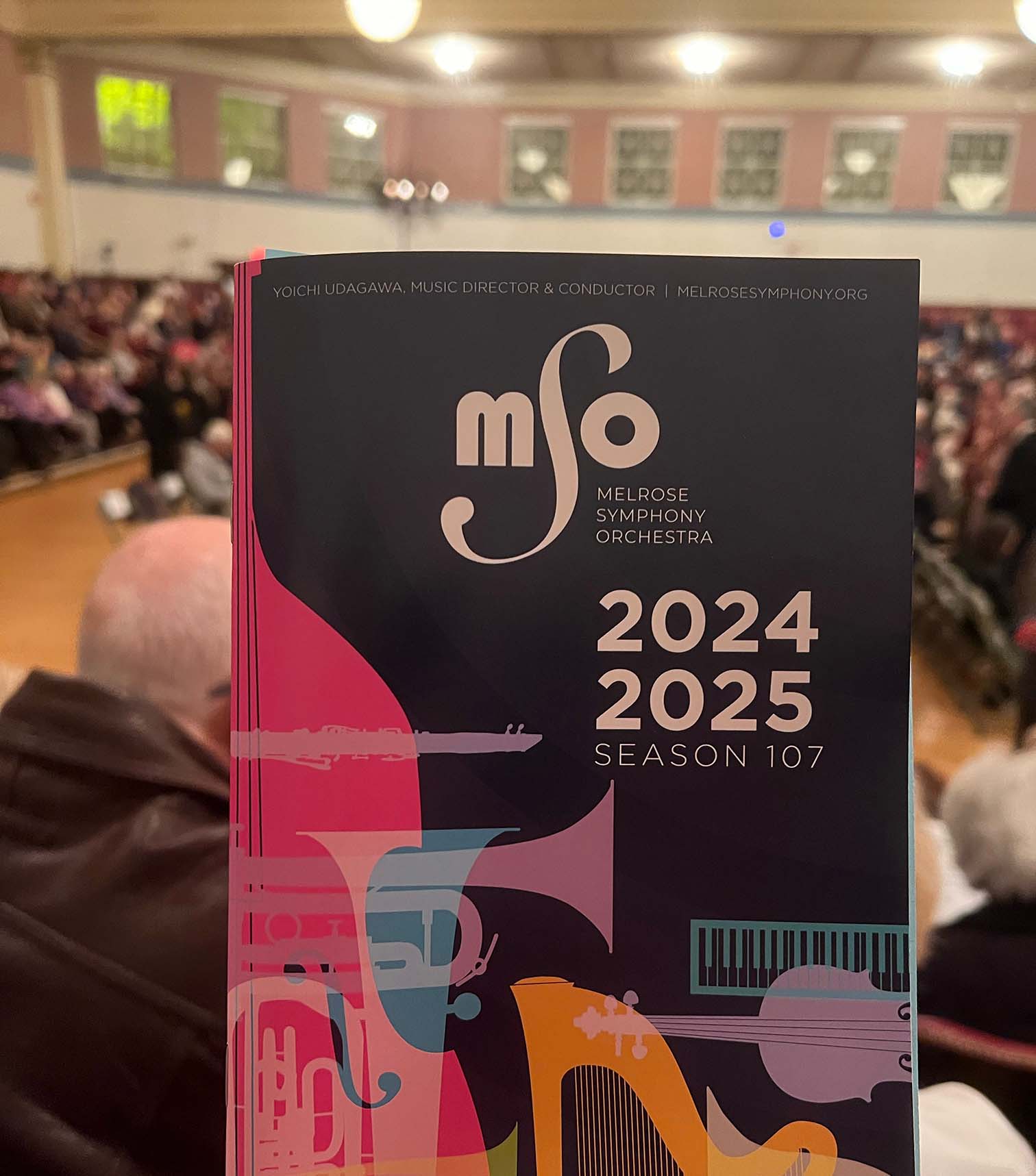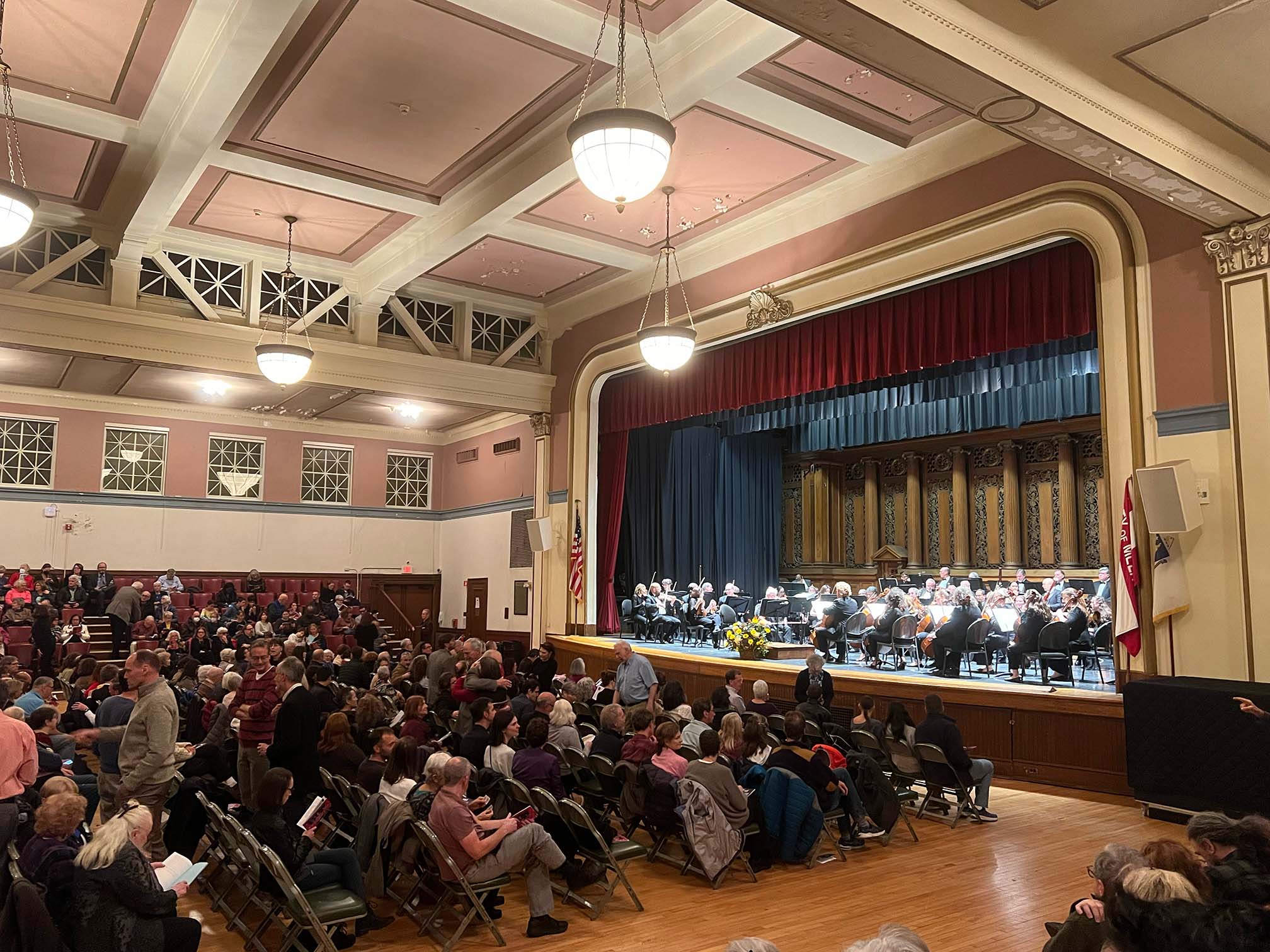Melrose Symphony Orchestra Kicks Off 107th Season With Returning Guest Soloist

On Saturday evening, November 2nd, Memorial Hall was packed with audience members eager to hear the Melrose Symphony Orchestra (MSO) in their opening night concert for the 2024-25 season, their 107th. The program, which featured pieces by Beethoven, Saint-Saëns, and Tchaikovsky, showcased a range of pieces by European composers within the Romantic period.
The MSO was founded in 1918, and is the oldest continuously performing all-volunteer orchestra in the United States. Music director and conductor Yoichi Udagawa explained that although the players are all volunteers, many of them have studied their instruments extensively and some are music teachers or retired professional players. “It’s a real passion for them,” he said, “and even though they are technically ‘amateurs,’ they play at a really high level.”
Many faces in orchestra are familiar to longtime fans, because, as Udagawa explained, “there is a core of people who have been playing in the orchestra for a long time.” Udagawa himself has been conducting the orchestra since 1997. However, the MSO also has a long history of supporting student players and helping them develop as musicians before some of them go on to pursue professional careers. “It’s stimulating for them,” said Udagawa, “and for the adult players as well, to have that young energy and enthusiasm come in.”
The MSO’s role as a place where young players can develop their art was on full view at Saturday’s concert, as Melrose native Nicholas Finch returned as the guest soloist. Finch grew up in Melrose and played in the MSO as a teenager before going on to study at Harvard and Juilliard. He is currently the principal cellist of the Louisville Orchestra, and has played with and conducted a number of other ensembles. “This is the town that raised me, and the orchestra that raised me,” Finch reflected onstage.

After Udagawa walked onstage to begin the concert, he asked the audience whether they would prefer to have Finch conduct the first piece on the program, Ludwig von Beethoven’s Egmont Overture. That suggestion received thunderous applause, and Finch walked onstage to conduct. Afterward, Finch joked that Udagawa had suggested he conduct the Beethoven at 11:30 the previous evening, while they were out with several other members of the orchestra at J.J. Grimsby’s.
The Egmont Overture is the only piece that is still performed out of the score Beethoven was commissioned to write for a tragic play by Wolfgang von Goethe. The play tells the story of Count Egmont, a 16th-century statesman in the Spanish Netherlands who was executed for his opposition to religious persecution. The music in the overture depicts a battle, Egmont’s execution, and finally, a triumphant ending reflecting hope for the future.
Finch ably conducted the Beethoven overture, then returned to play Camille Saint-Saëns’ Cello Concerto No. 1. The Saint-Saëns allowed Finch to show off his remarkable talents and the beautiful tone of his playing, with virtuosic passages and sections that showed off the full range of his instrument. The orchestra supported him throughout, allowing his playing to shine and coming in strong when the music called for it.
Finally, Finch joined the cello section to play the last piece of the evening, Pyotr Ilyich Tchaikovsky’s Symphony No. 5. Udagawa introduced the piece by pointing out that this was one of the first symphonies to feature the same melodic motif in all four movements, and had the orchestra demonstrate how the theme sounded in each movement.
Throughout the concert, the orchestra's sound was strong and warm, allowing the listener to be carried away by the music as it carried throughout Memorial Hall.
While the MSO presents a high-quality symphony experience, Udagawa also tries to make the music accessible to the audience and make the concert experience lighthearted and fun. “When you think about the times this music was written in,” Udagawa reflected, “this music was meant to be enjoyed, to enthuse people. Oftentimes at a symphony concert, you’re not supposed to clap between movements,” he went on, “but at our concerts, often people do, and I encourage it. When you look back at the history of it, people regularly clapped between movements, or even during movements...Tchaikovsky would have been thrilled that people loved the music and were excited by it instead of just sitting still and quiet.”
The MSO is well-loved within the community, and Saturday night’s concert was no exception. “We’ve always had tremendous support from the audiences, and from the community in Melrose,” said Udagawa, noting that the opening night concert had nearly sold out, and the upcoming Holiday Pops performances in December are already close to selling out as well. “We have a great audience, and we really appreciate the support of the community,” Udagawa went on. “We want to have fun at our concerts, and we want the audience to have fun, too.”
You can buy tickets for the MSO's upcoming concerts at their website or by mail.

Follow Us: